L'Acadie Vineyards Blog
Welcome to the L'Acadie Vineyards blog and winery news
Climate Change and Nova Scotia sparkling
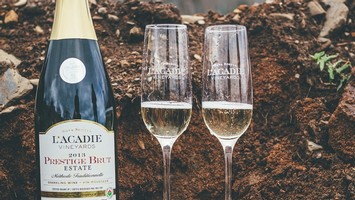
I was recently asked to sit on a panel about the effects of climate change to the Nova Scotia wine industry. This request adds to a significant increase in focus lately - there are new research proposals on how vineyards can be more resilience, trade conferences like Tasting Climate Change, and of course much research into the February Polar Vortex event...which interestingly happened after the panel topic was chosen.
I plan to discuss organic farming and the benefits of resilience. And then share data and trends of grape maturity for sparkling wine.
Organic Viticulture
Organic viticulture, the practice of growing grapes without synthetic chemicals, can make a vineyard more resilient to climate change in several ways:
- Improved soil health: Organic viticulture relies on the use of natural fertilizers and soil amendments, which can improve soil structure and water-holding capacity. This means that the soil can retain more moisture during droughts and absorb excess water during heavy rains, reducing erosion and soil compaction.
- Improved mycorrhizal fungi networks: living soils are optimized in an organic system – pesticides, synthetic fertilizers and excessive tillage reduce populations. The expanded influence by this network to the root zone allows vines to source more nutrients to have higher tissue sugars for cold hardiness and disease resistance.
- Biodiversity: Organic vineyards typically encourage biodiversity by providing habitat for insects and other wildlife. This can help to create a more resilient ecosystem that is better able to adapt to changes in climate and weather patterns.
- Reduced carbon footprint: Organic viticulture often involves the use of more sustainable practices, such as cover cropping, reduced tillage, and the use of natural pest management strategies. These practices can help to reduce the carbon footprint of the vineyard, which can contribute to mitigating the effects of climate change.
- Resilient grape varieties: Organic viticulture may favor grape varieties that are better adapted to the local climate and soil conditions. This can result in a more diverse and resilient vineyard that is better able to withstand extreme weather events such as drought, heatwaves, or cold snaps.
Overall, organic viticulture can help to create a more sustainable and resilient vineyard ecosystem, which is better equipped to adapt to the challenges of climate change.
Sparkling Mecca
The 2010 growing season was the first time I felt heat that reminded me of my previous sparkling career in the Okanagan Valley of British Columbia. We had moved back to Pauline's home province in 2004 to make sparkling wine in a better climate for the style. Coincidently, that year corresponds closely to what researchers in our region identify as the start of the effects of climate change, and it marked our second vintage to earn medals at Effervescents du Monde in France.
Read more about the contrasts of making sparkling wine in the two regions.
/blog/Vintage-2022-and-Climate-Change-in-Nova-Scotia
Moderate sugars, acid retention and brown lignified (ripe) seeds are the characteristics of a world-class sparkling region, and Nova Scotia has it! As it gets warmer, though, we have been watching acidity more closely and adjusting pick dates to keep optimal freshness. See below for data from 14 years of harvesting Prestige Brut Estate from the same block showing that we have been not only maintaining freshness but also slightly trending higher acidity.
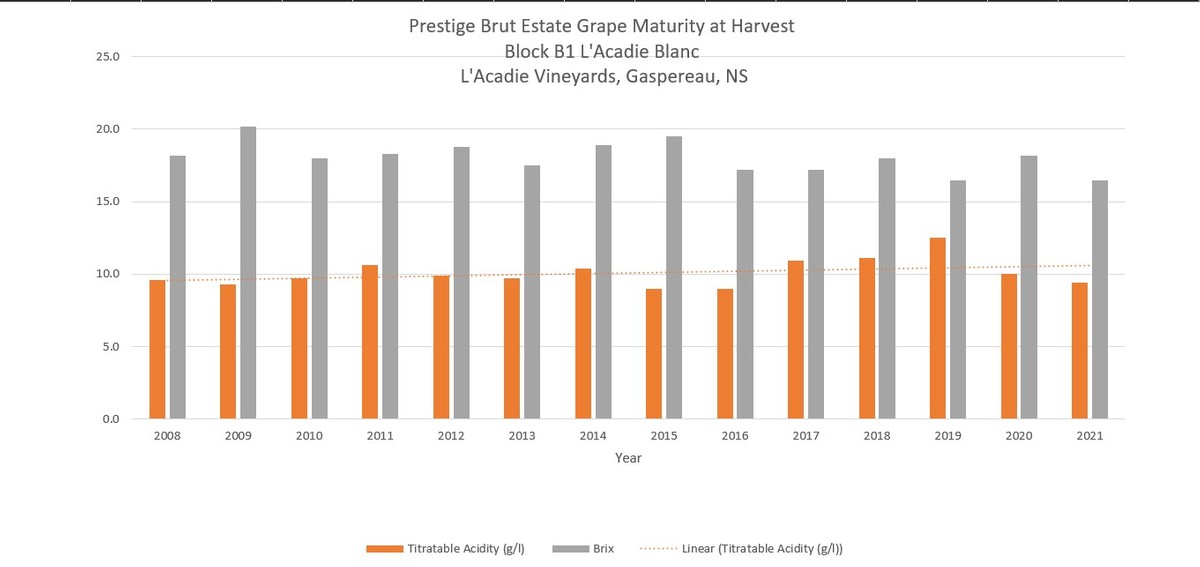
Other strategies to retain freshness in a warming climate is to prune for more crop....more grapes per vine tends to increase acidity and lower sugars at harvest. There are limits though. Champagne regulations usually have an upper limit of 10-12 tonnes per hectare, approximately 4-5 tonnes per acre, and many growers crop even higher and sell the unusable excess to distillers. But at these crop levels and higher there can be impacts on flavour and, to a lesser degree, possible nutrient deficiencies in the juice causing fermentation problems. Remember we are still striving for ripeness, and what works in Champagne might not work here in Nova Scotia. Most of the vintages listed above were cropped at 3-4 tonnes per acre, which matched our terroir of rocky well-drained soil with about 8 inches of humus-rich top soil in the block where we grow Prestige Brut Estate. And all years had brown seeds, ripeness!
Transparency and Sustainability: the benefits of choosing certified organic and vegan wines
Transparency and Sustainability: the benefits of choosing certified organic and vegan wines
Welcome to our blog! We are passionate about certified organic and Biocyclic Vegan wines, and committed to sustainability and transparency in everything we do. Discover why our award-winning wines are a must-try for health-conscious wine lovers.
Ingredients
Transparency is a cornerstone of certified organic and certified Biocyclic Vegan wines, backed by rigorous inspections of grape growing and winemaking, to inform you of what is not in your wine. The Canadian Organic Standard prohibits genetically modified ingredients, synthetic pesticides and synthetic fertilizers, and the Biocyclic Vegan International Standard prohibits animal inputs in the vineyard and winemaking. This effectively eliminates many common ingredients and since nutritional information and ingredient declarations are not required for wines, certified organic vegan wines are your only guarantee of what wasn’t added to them.
The certification logos on labels are your guide to choose wisely. You can also view our list of organic wines at our certifier’s site,

Health
Lower alcohol in cool climate wines offers a health advantage, another benefit of buying local. Add the health benefits of organic wines and you have a winning combination! You avoid synthetic pesticide residues - yes, every spray in the vineyard makes it into your glass, and preservatives such as potassium sorbate. Sulfite is naturally occurring, produced by yeast, and organic winemakers can only adjust sulfite levels to half the maximum in federal standards.
Alcohol and Wine - new Canadian alcohol consumption recommendations
Social Change and Environment
Biocyclic Vegan standards start in the vineyard compared to other vegan certifications that just focus on winemaking. These wines are vegan from soil to glass, and not using animal manures is a clear message to oppose conventional livestock practices. Composted grape pomace, left over after pressing, is alternatively used to create a humus-rich soil teeming with beneficial microbes - a living soil that supports vine health.
Cover crops and no-till practices, a pillar of organic agriculture, promote living soils and better nutrients, and mounting information indicates that carbon-holding benefits can lessen global warming.
Water and air quality benefits from organic practices are well proven. Nanotechnology is prohibited because these engineered substances in food and packaging can add to the problems of plastics in our water systems and our health..
~~In vino veritus
Vineyard Update - Polar Vortex Impact
Vineyard Update - February 4 Polar Vortex Impact
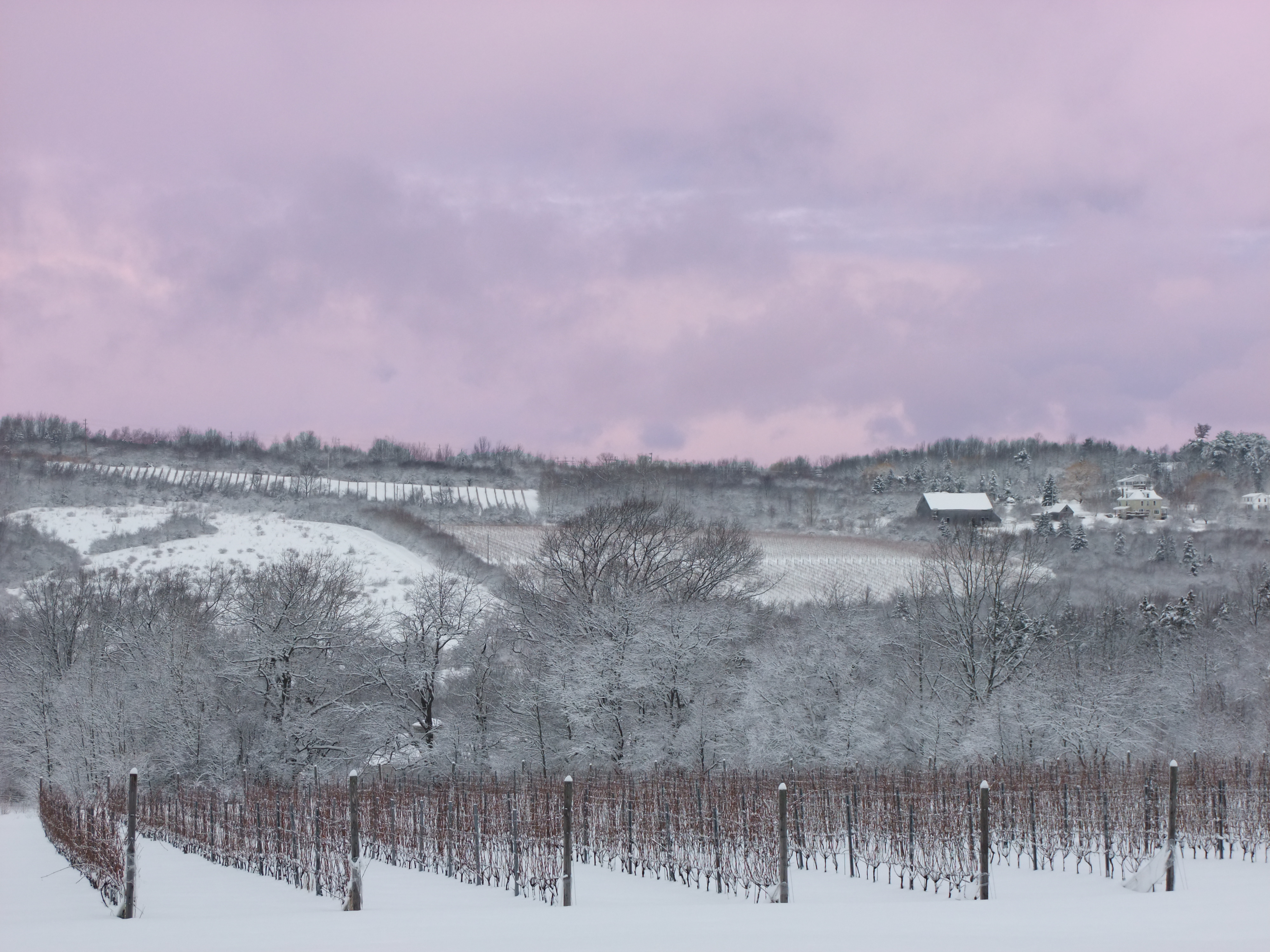
On February 4 and 5 our estate Gaspereau vineyard experienced a bud-damaging cold temperature of -25C. We are still assessing the impact of the polar vortex event but preliminary bud viability analysis is indicating about 65% bud loss in our L’Acadie blocks. We haven’t assessed Chardonnay, Sauvignon blanc and Pinot Noir yet but have heard from our industry that vinifera vines were hardest hit and that it might take years for recovery. Minimum temperature and bud loss at our Gaspereau Valley location seems to be similar to other vineyards in Annapolis Valley and we are plugged into information and guidance from our Nova Scotia Grape Growers Association and researchers at the Kentville Research Centre and Perennia.
Why is there so much impact?
It is being described as a “perfect storm” for severe crop damage mainly due to the unseasonal warm January that prevented vines from reaching their normal bud hardiness. The weather event was an advective freeze with winds preventing inversion or radiative warm air. Snow cover was not enough to give any blanketing insulation effects but the hilled soil over the trunks of our vinifera vines hopefully protected them from severe trunk damage.
What is the impact on our wine production?
We are adjusting our pruning to leave more canes and buds which will hopefully give us a reasonable 2023 crop. After the 2018 spring frost, our L’Acadie blocks adjusted to the shorter growing season to ripen a small crop, and we hope it will show its suitability to our climate again. Also, our organic and vegan vineyard practices should give us a measure of resilience to climate change and we may see those benefits as the growing season progresses. Climate Change and 2022 Vintage
Inventories of tiraged aging traditional method sparkling will be impacted for future releases in much the same effect as the 2018 frost. Release of 2020 Vintage Cuvee and 2020 Vintage Cuvee Rose will continue as planned for this spring.
Our 2022 Tidal Bay production is less than previous years and we will have to allocate 2023 sales accordingly. Similarly, charmat method
Alcohol and Wine
A new report from the Canadian Centre for Substance Use and Addiction has found that any more than two drinks a week is a health risk. This is sharply reduced from the past 10-15 drinks per week guideline.
https://www.cbc.ca/news/health/alcohol-cancer-risk-warning-1.6715769
This could lead to mandatory alcohol warnings on wine bottle labels, a good step towards transparency, and has me thinking of other label declarations that would benefit consumers.
I welcome transparency much like we are transparent with our organic wine and vegan wine traceability. Consumers have a right to know where their food is from, how it was produced and, yes, health risks involved. The responsibility has always been on organic producers to prove their integrity with inspections and audits, but shouldn’t non-organic farmers be required to provide a list of carcinogenic pesticides like Round-up, a widely used herbicide, recognized by WHO (World Health Organization) as a probable carcinogen. I have worked for large wineries and was always amazed seeing the same pesticides used in the vineyard always show up on the pesticide analysis of bottled wine.
Another level of transparency for consumers in GMO labelling. Genetically modified food does not have to be declared on labels in Canada or the USA, but are required in EU.
Will this new alcohol consumption report and possible label warnings affect wine sales? Wine is different than other alcoholic beverages and it’s possible that its alignment with food, lifestyle and moderation might give it more resilience. Nova Scotia wines in particular have lower alcohols than warmer wine regions – Tidal Bay, the region’s signature white blend, must be less that 11.0 % alcohol.
Give consumers information they need and let them make wise choices.
Research on microbial terroir and its impact on wine flavour
Research on microbial terroir and its impact on wine flavour - play the video
~a collaboration with Saint Mary's University on indigenous microbe populations in our Gaspereau estate vineyard and the resulting flavour of our Pet Nat and other organic wines
SMU Clarissa Sit V2 from Saint Mary's University on Vimeo.
More blogs about our certified organic vegan vineyard:
Vintage 2022 and Climate Change in Nova Scotia
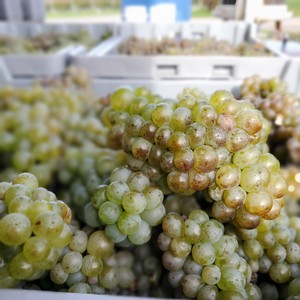
Vintage 2022 is now complete and amid these record-breaking warm November temperatures it is time to reflect on how climate change is affecting our wine region and our Gaspereau winery. But first, let’s compare another wine region, the Okanagan Valley in British Columbia.
I made sparkling wine in the Okanagan as head winemaker at See You Later Ranch winery and then Summerhill Pyramid winery for eight years before we moved back to Nova Scotia in 2004. It’s hot there. Quite often 40C hot. I had to make many compromises to produce sparkling wine in that heat, quite often having to pick grapes early to avoid too much sugar accumulation, to avoid boozy alcoholic base wines. But the problem was the flavours weren’t always there yet – the seeds were green.
We moved to Nova Scotia to eventually release the province’s first traditional method sparkling wines and I felt like we had found sparkling paradise. Compromises were in my rear-view window – I bragged to my winemaking friends in BC about the moderate sugar levels, acid retention and perfectly ripe grapes, with lignified brown seeds. These are ideal conditions for a world-class sparkling region!
There is a warming trend in Nova Scotia, especially since 2020, and we have been watching grape acidity levels more closely and harvesting earlier for perfect freshness. Vintage 2022 was the warmest season in three years and we picked early, in September, but it’s important to note that our characteristic flavours from our unique terroir didn’t change. A potential impact with a shorter growing season that we are not seeing yet.
Other Effects
Other effects of climate change in our wine region can be viewed as negative, and sometimes cautiously positive. Hurricanes can damage fragile grapevine shoots and even break trellis posts, especially is they occur when there is full foliage acting like a sail in the wind. Droughts can cause vine stress for our non-irrigated farming systems. Extreme weather is scary. Milder winters can allow more insects to survive, and there are new vineyard pests on our doorstep that could flourish.
It is hard to pull benefits from global warming, but milder winters and more heat units in the growing season could allow Nova Scotia to grow more sensitive grape varieties such as Chardonnay.
So How Can We Adapt?
We planted Chardonnay, Pinot Noir and Sauvignon blanc in 2019 on our Gaspereau Valley estate, and made sure to use drought resistant root stocks as much as possible. These are planned for sparkling wine styles with expected higher acidity retention, and wouldn’t it be great to produce a racy Sancerre-style still wine in the warm years.
We invested in a very ambitious charmat sparkling project in 2019 and after pandemic-related delays with equipment delivery from Italy we released Joie de Vivre in 2021. It complements our iconic traditional method sparkling line-up with an earlier-release, fruitier sparkling wine. Very popular. And adaptable to future warmer growing seasons.
Certified organic production, and now also certified Biocyclic Vegan from soil to glass, gives us more resilience to drought and pest pressures. Our practices of encouraging living soils with high fungal composted grape pomace, coupled with cover crops to keep carbon in the soil and encouraging biodiversity sets up a favourable environment for extreme weather. In this way, we are also doing our part to not add to global warming by producing organic wines and vegan wines.
Making Compost Tea
Making Compost Tea
Compost tea is an important part of our veganic practices, for organic and Biocyclic Vegan wine. Here is a little video.
- we compost our grape pomace, no animal manures
- Benefits: manage our living soil=better terroir flavours in wine, better disease resistance, micronutrients that activate positive plant responses
For more videos on winemaking and grape growing, see our winemaker's Youtube channel Professor Bubbly
June Newsletter
New Releases and a Word from our Winemaker
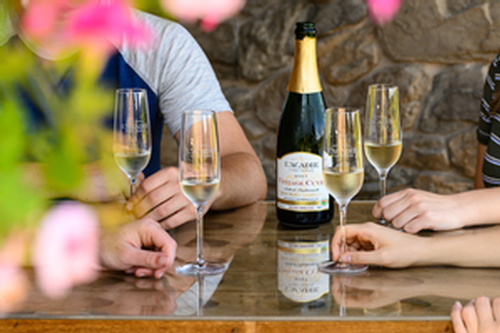
Wineshop and Tastings
Welcome to a new season of local wine! We are excited to greet visitors again with our award winning sparkling and still wines!! Certified organic and vegan, from soil to glass!!
Our open-air tastings and tours are by appointment again this year to ensure COVID-safe and intimate experiences. Masks are required in the wineshop.
Hours: Monday-Saturday 10:30-5pm, Sundays 12-4pm
New Releases
2021 Tidal Bay - we join other wineries of Nova Scotia in presenting our style of Tidal Bay: crisp and dry with enhanced minerality from our rocky ancient seabed terroir. Certified organic and Biocyclic Vegan wine, from soil to glass. Have a vertical tasting at home while our library of 2020 Tidal Bay lasts!
2021 Rose - all of our 2021 vintage wines have the Biocyclic Vegan certifying logo on the label. This year's organic vegan Rose is dry with strawberry and lime aromas.
2021 Star - It's back! We haven't released Star for several years, and many will remember this past award-winning white wine. Rich and weighty from skin contact of the ripest vegan and organic grapes from 2021. Winery and website exclusive
2020 Joie de Vivre - our newest sparkling wine, charmat method! A huge crowd pleaser and perfect for spring entertaining with many vegan food pairing options such as fresh salads and cold pasta dishes.
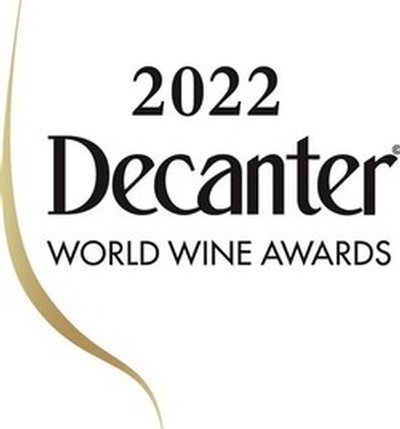
2015 Prestige Brut Estate wins Bronze at Decanter World Wine Awards 2022
We are pleased that our 2015 Prestige Brut Estate earned a bronze and 88 points at the 2022 Decanter World Wine Awards held in London, England. Scoring in the top 15 sparkling wines in Canada at this prestigious wine competition, this is the third vintage in a row for our certified organic and vegan Prestige Brut Estate to be awarded. Grapes are from the same block of our organic and vegan estate vineyard planted with L’Acadie blanc in 2006 on ancient seabed soil of schist, sandstone and slate gravels.
Wine club members have been getting first bottles and expected full release will be July 2022 at the winery.
“We bought our 30 acres of paradise in Gaspereau back in 2004 inspired by the soil and location potential for sparkling wine. It is so satisfying to earn international awards for our sparkling wines that are rooted over a metre deep into organic living soil.”, Bruce Ewert, co-owner and winemaker L’Acadie Vineyards.
A Word from our Winemaker Bruce Ewert
I would like to share with you why retail prices have increased on our wines. The primary reason for this increase is because of the $0.52 per bottle excise tax imposed by the federal government going into effect on July 1. This tax is the result of an Australian government trade challenge on the wine industry’s previous exemption that the Canadian government was unable to successfully defend. There are also mandatory price increases by NSLC for our listed wines that affect all retail locations.
On a positive ending note, the 2022 growing season is going well and the vines are starting to flower - you can smell it!. Our viticulture team has been working hard removing suckers from the trunks, controlling weeds with a tractor-mounted grape hoe, and tying canes.
Local ~ Organic ~ Vegan ~ Excellence
.----------------------------------------------------------------------------------------
Biodynamic and Biocyclic Vegan - what's the difference?
Both names start with “bio” and there are other similarities, but Biodynamic and Biocyclic Vegan practices diverge when it comes to animal use.
Our winery in Gaspereau, Nova Scotia is organic, grape growing and winemaking, and recently also certified Biocyclic Vegan from soil to glass. Our reasons for following these standards are that organic vegan wine is good for the planet, animals and people. Most people are familiar with Organic farming but may not have heard of Biocyclic Vegan or Biodynamic farming. Let’s compare all three.
Pesticides
There are many pesticides allowed for grapes, surface and internal acting. Grapes are listed as one of the dirty dozen, a list of heavily sprayed fruits and vegetables published by the Environmental Working Group. Hybrid grapes are fairly disease-resistant but more and more disease-susceptible vinifera grapevines are planted in Nova Scotia every year. Organic production follows the Canadian Organic Standard, the practice of producing food without synthetic pesticides, herbicides or genetically modified organisms (GMO), and certified organic is required to be able to certify your winery to Biodynamic or Biocyclic Vegan Standards.
Living Soil and Fertilizer
All three practices promote healthy microbial life in the soil. The concept is that the farmer manages the soil so that it can provide for the vine, rather than the conventional approach of feeding the vine directly with synthetic fertilizers. Biocyclic Vegan and Biodynamic farming both rely on enriching cover crops between the rows to hold carbon (regenerative agriculture) and to transfer atmospheric nitrogen to the soil. Compost teas, either plant residue or animal manure-based, are used to grow beneficial organisms to increase and stimulate life in the soil and on the vine. This is the first diverging practice - Biocyclic Vegan prohibits anything from animals so only plant residue teas are allowed such as composted grape pomace and there is a reliance on cyclical humus management with composted plant material. A second difference is the spiritual approach of Biodynamic - planting by calendar and using preparations such as burying cow horns filled with manure.
Biodiversity
All three practices promote harmony with nature. They support ecological protection and animal welfare, and the Biocyclic Vegan approach goes further by excluding all animals, both working animals and inputs from them, recognizing that there are deep ethical considerations. Biodiversity practices that follow this ethos strive for a higher level of harmony than Organic. Biodynamic has animal use required and takes into account the rhythms of nature with a more spiritual approach.
Both Biocyclic Vegan and Biodynamic have human development at their core, nuturing the social and economic development of people.
Winemaking
Organic winemaking is the logical final step to shepherd a wine to the bottle. The Canada Organic Standard has a limited list of natural and non-GMO additives that are allowed and the resulting organic logo on the bottle signifies traceability and third party inspections to give consumers confidence. If the wine is not certified organic with the logo on the label, the grapes can be from conventional sources, even if the winery estate vineyard is certified organic. Both Biocyclic Vegan wine and Biodynamic wine have their own additional logo and the same disconnect in traceability happens if they are not on the label. The major difference for the Biocyclic Vegan Standard is that it prohibits all animal inputs in winemaking, which can include gelatin and egg whites.



Environmental
This is where the divide widens considerably in Biocyclic Vegan’s favour. By prohibiting all animal inputs, it is not supporting the well documented global warming impact of the livestock industry. Biodynamic farming has animal use as its foundation with manures and preparations using animal organs, but has non-intensive and lower yielding requirements to lessen its environmental impact.
A final note. Our reasons for choosing the Biocyclic Vegan approach from "soil to glass" are rooted in a love for all living beings. As we grow our winery and inspire others, it is important to be informed and know that we all can make a difference.
"When you know better, you do better" ~ Maya Angelou


